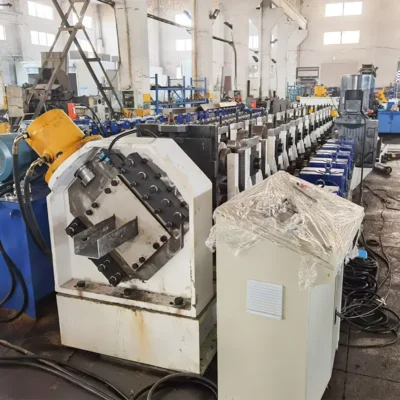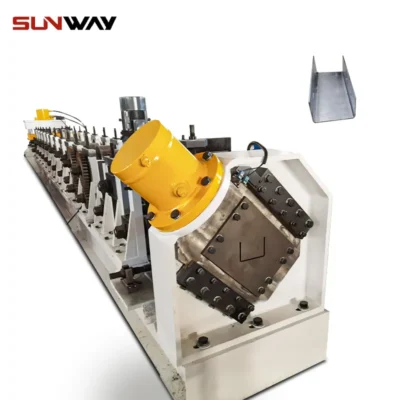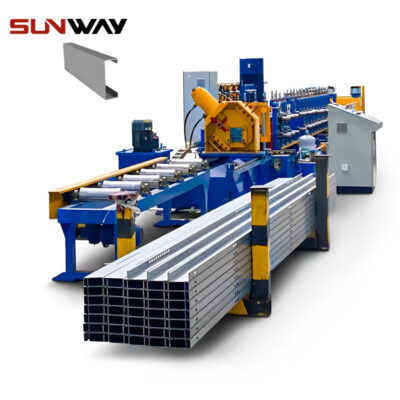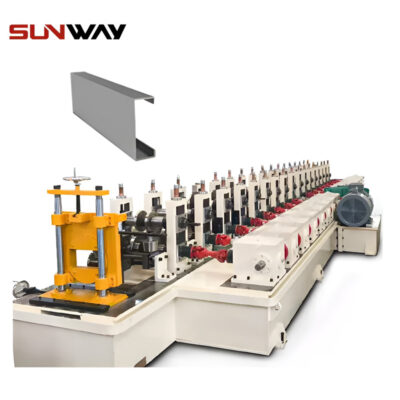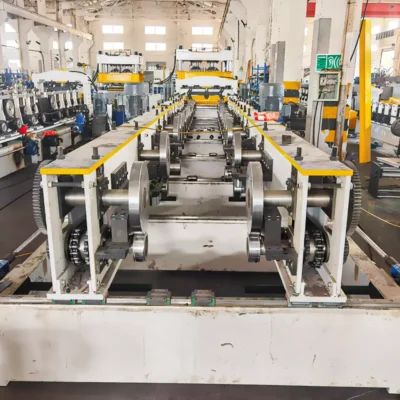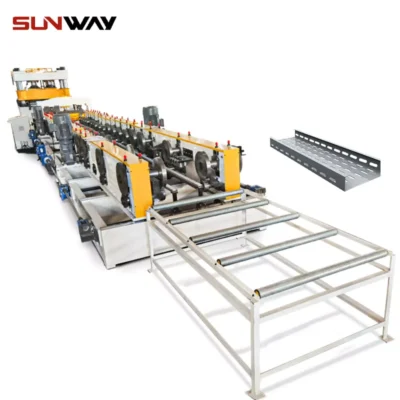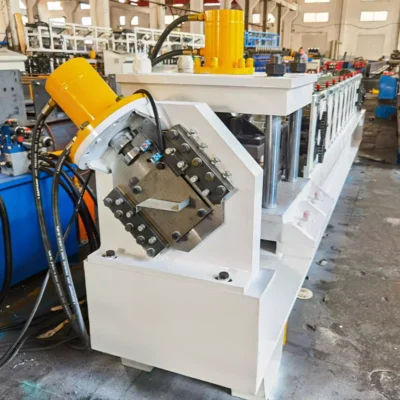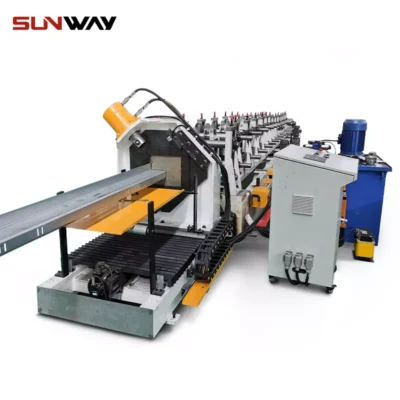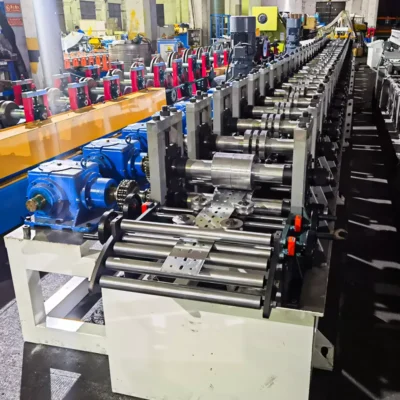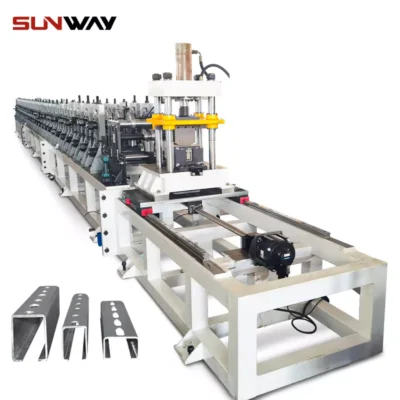The construction and interior design industries are embracing modular concepts like never before. Among the most prominent advancements is the rise of modular kitchens, which offer a sleek, efficient, and cost-effective solution for residential, commercial, and institutional spaces. At the heart of this innovation is the Kitchen Module Roll Forming Machine—a cutting-edge technology that enables the precise and efficient production of the structural frames and profiles needed for modular kitchens.
This comprehensive guide will explore Kitchen Module Roll Forming Machines, their applications, advanced features, pricing, and why Wuxi Sunway Machinery is a global leader in this field. Whether you’re a manufacturer of modular kitchens or a professional in the construction industry, this article will provide valuable insights into how roll-forming technology is revolutionizing kitchen design and manufacturing in 2025.
What is a Kitchen Module Roll Forming Machine?
A Kitchen Module Roll Forming Machine is a specialized piece of equipment designed to produce the structural frames, profiles, and panels used in modular kitchen units. These machines transform raw metal coils or sheets into precise shapes, including U-channels, box sections, and custom profiles, which are then assembled into kitchen cabinets, countertops, and storage units.
The roll-forming process ensures that these components are lightweight, durable, and dimensionally accurate, making them ideal for modular kitchens. These machines not only streamline the production process but also enable manufacturers to deliver high-quality, customizable kitchen modules at scale.
Applications of Kitchen Module Roll Forming Machines
The profiles and frames produced by Kitchen Module Roll Forming Machines are used in various modular kitchen setups. Below are the primary applications:
1. Residential Kitchens
- Use Case: Modular kitchens for apartments, condos, and single-family homes.
- Why It Matters: Roll-formed profiles provide a sleek, modern aesthetic while ensuring structural stability and durability.
2. Commercial Kitchens
- Use Case: Pre-fabricated kitchen units for restaurants, cafes, and catering services.
- Why It Matters: Corrosion-resistant frames withstand heavy use and ensure compliance with food safety standards.
3. Institutional Kitchens
- Use Case: Modular kitchens for schools, universities, and office cafeterias.
- Why It Matters: Lightweight frames simplify installation in large-scale projects and reduce construction timelines.
4. Hospitality Sector
- Use Case: Compact and elegant kitchen modules for hotels, resorts, and vacation homes.
- Why It Matters: Customizable designs cater to a variety of aesthetic and functional requirements.
5. Modular Kitchen Showrooms
- Use Case: Pre-fabricated kitchen displays for retail outlets and showrooms.
- Why It Matters: Roll-formed profiles allow for the quick assembly of versatile and visually appealing setups.
6. Outdoor Kitchens
- Use Case: Modular kitchen units for outdoor use in residential and commercial spaces.
- Why It Matters: Profiles made from corrosion-resistant materials ensure durability in harsh weather conditions.
Key Features of Wuxi Sunway Kitchen Module Roll Forming Machines
When it comes to manufacturing modular kitchen components, Wuxi Sunway Machinery offers state-of-the-art roll-forming machines that combine cutting-edge technology with precision engineering. Here’s what makes their machines stand out:
1. Multi-Profile Production
- What It Offers: Machines can produce a variety of profiles, including U-channels, C-sections, and box sections.
- Why It’s Revolutionary: Supports the production of kitchen modules for diverse designs and functions.
2. Material Versatility
- Supported Materials:
- Galvanized steel
- Stainless steel
- Aluminum alloys
- Pre-coated steel
- Why It Matters: Enables the production of frames that are lightweight, corrosion-resistant, and visually appealing.
3. High Precision and Tolerance
- What It Does: Produces profiles with tight tolerances and smooth finishes.
- Why It’s Important: Guarantees perfect fitting and alignment during module assembly, reducing errors and rework.
4. Integrated Cutting and Punching Systems
- Features: Servo-controlled cutting and punching units create precise cuts, holes, and slots.
- Why It Matters: Eliminates the need for secondary operations, saving time and costs.
5. Customizable Designs
- What It Offers: Machines can be configured to produce custom profiles tailored to specific modular kitchen designs.
- Why It’s Revolutionary: Supports manufacturers in meeting unique customer preferences and market demands.
6. High-Speed Production
- Performance: Machines can produce up to 25 meters of profiles per minute, depending on the design.
- Why It Matters: Meets the high-volume demands of modular kitchen manufacturers.
7. Fully Automated Operations
- Features:
- PLC-controlled systems with a user-friendly interface.
- Real-time monitoring and error detection.
- Automated stacking and packaging systems.
- Why It’s Revolutionary: Reduces reliance on skilled labor while ensuring consistent quality.
8. Eco-Friendly Operation
- What It Offers: Energy-efficient motors and waste-reducing technologies.
- Why It Matters: Supports sustainable manufacturing practices and reduces operational costs.
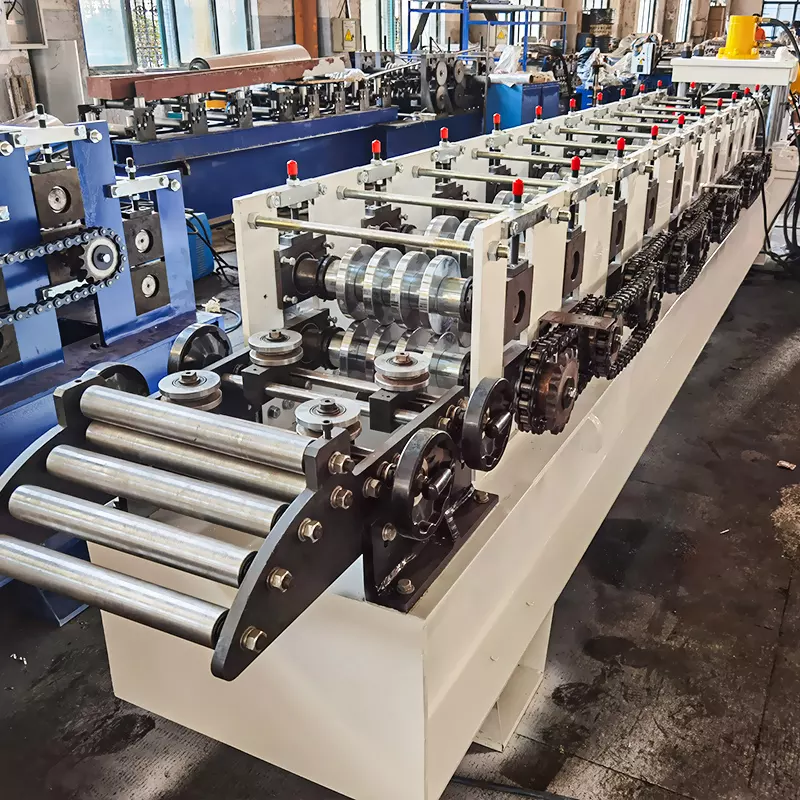
Production Workflow of a Kitchen Module Roll Forming Machine
The production process for modular kitchen components is designed for efficiency and precision. Here’s an overview of the workflow:
1. Decoiling
- Raw metal coils are loaded onto the decoiler, which feeds the material into the machine.
2. Leveling
- A leveling system ensures the material is flat and free from warping or defects before entering the roll-forming section.
3. Roll Forming
- The material passes through a series of rollers that gradually shape it into the desired profile, such as a U-channel or box section.
4. Cutting and Punching
- Integrated cutting units trim profiles to the required lengths, while punching systems create holes or slots as needed.
5. Surface Finishing (Optional)
- Additional treatments, such as powder coating or anti-corrosion finishes, can be applied to enhance durability and aesthetics.
6. Stacking and Packaging
- Finished profiles are automatically stacked and packaged for easy transportation and assembly.
Pricing of Kitchen Module Roll Forming Machines
The cost of a Kitchen Module Roll Forming Machine depends on its features, production capacity, and customization options. Below is a general pricing guide for 2025:
| Machine Type | Capabilities | Price Range (USD) |
|---|---|---|
| Standard Machines | Basic profile production | $200,000–$350,000 |
| High-Precision Machines | Advanced tolerances and multi-profile output | $350,000–$500,000 |
| Fully Customizable Machines | Multi-material compatibility and custom features | $500,000–$800,000 |
For tailored pricing and financing options, contact Wuxi Sunway Machinery.
Advantages of Using Kitchen Module Roll Forming Machines
Investing in a Kitchen Module Roll Forming Machine provides significant benefits for manufacturers:
1. Enhanced Production Efficiency
- High-speed operation reduces lead times and increases output.
2. Precision and Consistency
- Ensures uniform quality across all components, minimizing assembly errors.
3. Material Flexibility
- Supports a wide range of materials, including pre-coated and corrosion-resistant alloys.
4. Cost Savings
- Reduces material waste and labor costs, improving overall profitability.
5. Scalability
- Suitable for both small-scale manufacturers and large-scale production lines.
FAQs About Kitchen Module Roll Forming Machines
| Question | Answer |
|---|---|
| Can the machine produce custom profiles? | Yes, it supports multi-profile capabilities for customized modular kitchen designs. |
| What is the production speed? | Machines can produce up to 25 meters of profiles per minute, depending on the design. |
| Does Sunway provide training? | Absolutely! Wuxi Sunway offers comprehensive training for operators and technicians. |
| What is the expected lifespan of the machine? | With proper maintenance, the machine can last 10–15 years or more. |
| Are financing options available? | Yes, flexible financing options are offered to qualified buyers. |
| Does the machine support pre-coated materials? | Yes, it is designed to handle pre-coated and pre-painted materials with precision. |
Global Trends Driving Demand for Kitchen Module Roll Forming Machines
The global shift toward modular construction and customizable interiors is fueling the adoption of Kitchen Module Roll Forming Machines. Here are the top trends behind this surge in demand:
1. Increasing Demand for Modular Kitchens
- The Trend: Modular kitchens are no longer a luxury; they are becoming a necessity in urban and suburban housing, with the modular kitchen market projected to grow at a CAGR of 6.5% through 2030.
- Impact on Roll Forming: The need for mass production of modular kitchen components has led manufacturers to invest in high-speed, precise roll-forming technology.
- Why It Matters: Roll-forming machines allow manufacturers to meet large-scale demand without compromising on quality.
2. Urbanization and Smart Living Solutions
- The Numbers: By 2030, more than 60% of the world’s population will live in urban areas, creating a demand for space-efficient solutions like modular kitchens.
- Why It’s Relevant: Modular kitchens optimize space in apartments and condos, and roll-forming machines enable the production of compact, high-strength frames for these kitchens.
3. Rising Middle-Class Spending
- The Shift: The growing middle class is driving demand for affordable yet stylish modular kitchens.
- Impact on Roll Forming Machines: Manufacturers need cost-effective production methods to cater to this price-sensitive segment, making roll-forming machines an indispensable tool.
- Why It’s Crucial: Roll-forming technology ensures cost savings through reduced material waste and high production efficiency.
4. Demand for Customization
- The Opportunity: Consumers are increasingly seeking personalized kitchen designs that align with their tastes and lifestyles.
- Why It Matters: Roll-forming machines with customizable tooling systems provide manufacturers with the flexibility to produce profiles tailored to unique design requirements.
5. Expansion of Hospitality and Co-Living Spaces
- The Trend: Hotels, co-living spaces, and serviced apartments are turning to modular kitchens for quick installations and uniform aesthetics.
- Why It’s Exciting: Roll-forming machines allow for the production of durable, corrosion-resistant profiles that meet the rigorous demands of commercial and shared spaces.
6. Focus on Sustainabilit
- The Push: Eco-conscious consumers and regulations are driving the industry toward sustainable practices.
- Why It’s Relevant: Roll-forming machines support the use of recyclable materials and minimize production waste, aligning with global sustainability goals.
Technological Advancements in Kitchen Module Roll Forming Machines
As we step into 2025, technology continues to redefine the capabilities of Kitchen Module Roll Forming Machines. Below are the advancements transforming this industry:
1. AI-Driven Process Optimization
- What It Does: Artificial intelligence monitors production processes, identifies inefficiencies, and adjusts machine settings for optimal performance.
- Benefits:
- Ensures consistent quality across all profiles.
- Reduces material waste by detecting defects early.
- Improves production efficiency through real-time data analysis.
2. Multi-Material Processing
- The Innovation: Modern machines can process a variety of materials, including steel, aluminum, and composite alloys.
- Why It’s Revolutionary:
- Expands the range of applications for kitchen modules.
- Supports the production of lightweight yet durable profiles.
- Meets the aesthetic and functional needs of diverse markets.
3. IoT-Enabled Smart Machines
- How It Works: IoT sensors collect real-time data on machine performance, material usage, and output quality.
- Advantages:
- Enables remote monitoring and diagnostics.
- Facilitates predictive maintenance to minimize downtime.
- Supports integration into smart factory ecosystems for seamless operations.
4. Servo-Driven Precision
- The Technology: High-precision servo motors control the rollers, cutting units, and punching systems.
- Why It’s Crucial:
- Ensures flawless dimensions and smooth finishes.
- Supports high-speed production without compromising accuracy.
- Reduces energy consumption, aligning with sustainability goals.
5. Modular Tooling Systems
- What It Offers: Machines feature interchangeable tooling systems for quick transitions between different profile designs.
- Why It’s Important:
- Simplifies the production of custom kitchen components.
- Reduces downtime during product changes.
- Enhances flexibility for manufacturers serving multiple markets.
6. Energy-Efficient Designs
- What It Includes: Machines are equipped with energy-saving motors and regenerative braking systems.
- Why It Matters:
- Lowers electricity consumption, reducing operational costs.
- Aligns with global efforts to reduce carbon emissions.
- Enhances eco-friendly manufacturing practices.
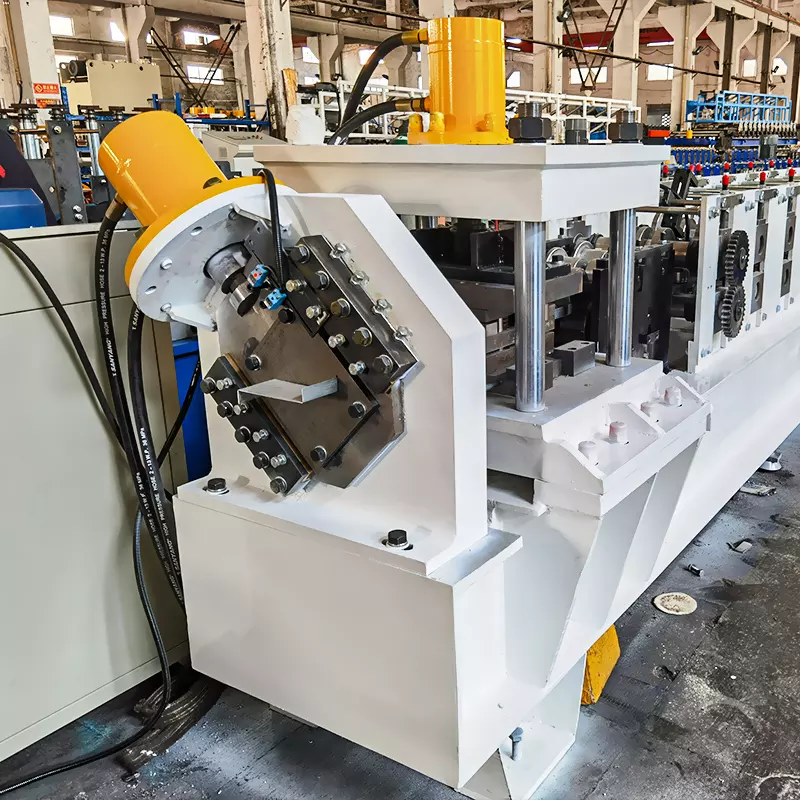
Environmental Impact of Kitchen Module Roll Forming Machines
Sustainability is no longer optional—it’s an industry standard. Wuxi Sunway’s Kitchen Module Roll Forming Machines are designed to minimize environmental impact while maximizing efficiency. Here’s how:
1. Reduced Material Waste
- How It Works: Roll-forming technology shapes metal precisely, minimizing scrap and offcuts.
- Impact:
- Conserves raw materials, reducing environmental impact.
- Lowers material costs for manufacturers.
2. Recyclable Materials
- What It Supports: Machines can process eco-friendly materials, such as aluminum and pre-coated steel, which are fully recyclable.
- Why It Matters:
- Promotes a circular economy by enabling material reuse.
- Reduces landfill waste and supports green building initiatives.
3. Energy Efficiency
- The Innovation: Modern machines consume less energy while maintaining high production speeds.
- Why It’s Crucial:
- Helps manufacturers reduce their carbon footprint.
- Aligns with global sustainability goals, such as net-zero emissions.
- Improves profitability by lowering electricity costs.
4. Localized Production
- What It Enables: Machines allow manufacturers to produce modular kitchen components locally, reducing the need for long-distance transportation.
- Outcome:
- Cuts down on emissions associated with shipping.
- Enhances regional sustainability and supply chain reliability.
Additional FAQs About Kitchen Module Roll Forming Machines
| Question | Answer |
|---|---|
| Can the machine handle pre-coated materials? | Yes, it is designed to process pre-coated and pre-painted steel with precision. |
| What is the typical production speed? | Machines can produce up to 25 meters of profiles per minute, depending on the design. |
| Are custom profile designs supported? | Absolutely! The machine supports multi-profile capabilities for customized kitchen designs. |
| What is the warranty period for Sunway machines? | Wuxi Sunway offers a standard warranty with optional extended service agreements. |
| Does the machine include operator training? | Yes, comprehensive training is provided with every machine purchase. |
| Are financing options available? | Yes, flexible financing options are offered to qualified buyers. |
Why Choose Wuxi Sunway Machinery for Kitchen Module Roll Forming Machines?
Here’s why Wuxi Sunway Machinery is a trusted name in the roll-forming industry:
- Proven Expertise: Decades of experience in designing and delivering innovative roll-forming solutions.
- Global Reach: Trusted by clients in Asia, Europe, the Americas, and beyond.
- Customization Excellence: Machines tailored to meet specific kitchen module designs and material requirements.
- Sustainability Leadership: Eco-friendly designs that minimize waste and reduce energy consumption.
- Cutting-Edge Technology: Features like IoT integration, AI-powered quality control, and servo-driven systems.
- Comprehensive Support: From installation to troubleshooting, Sunway ensures seamless operations and customer satisfaction.
Conclusion: Redefining the Future of Kitchen Manufacturing
The Kitchen Module Roll Forming Machine is revolutionizing the production of modular kitchens by enabling the efficient manufacture of durable, customizable, and aesthetically pleasing components. Whether you’re designing kitchens for homes, restaurants, or hotels, these machines provide the precision, scalability, and sustainability needed to thrive in 2025 and beyond.
Ready to elevate your manufacturing capabilities? Contact Wuxi Sunway Machinery today to explore their advanced roll-forming solutions. Together, let’s build smarter, faster, and greener—one kitchen module at a time!

